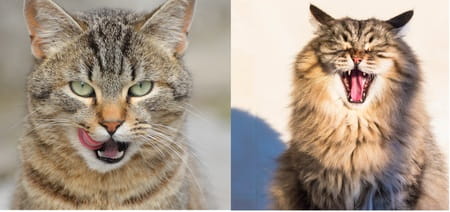
It might be nothing…and then again, it might mean a trip to the vet ASAP. Check out these researched possibilities:
- Yawns help to unwind, stretch facial muscles, settle down for sleep or energize to wake up
- Yawning might mean a lack of oxygen in the body—see your vet
- Feline lip licking could indicate allergies, respiratory issues or dental disease—consult your vet
- Anxious cats lick their lips—time for extra care
I spent a lot of time researching these expressions.
The information I found shows that they are two separate issues.
So, let’s deal with them one at a time.
When a cat is yawning…

Yawning may simply be a way for your cat to unwind…especially if it goes along with a good stretch.
Your cat may yawn before settling down for a nap or a good night’s sleep.
On the flip side, cats often yawn upon waking up…again, accompanied by a long, slow stretch.
Some experts think that felines yawn as a way to stretch their face and jaw muscles.
There is an idea that cats, like humans, may yawn as the body cools down after exercise, bringing more oxygen to re-energize the body.
Cats sometimes have standoffs with other animals. A yawn can be a way to bring things to a peaceful end.
However, just in case the other animal wants to keep things going, the cat has subtly shown its teeth as a warning.
Boredom and because others are yawning are two more reasons.

Having said all that…
A comment by a cat vet in a JustAnswer post discussed causes for concern.
The vet shared that frequent yawning means your kitty is not getting enough oxygen from their regular breathing rate.
This could be a symptom of a respiratory issue.
It could also point to a cardiac (heart) problem.
Recommendation: Take your pet to the vet.
When a cat is licking its lips…

Cats may lick their lips after eating or as part of their grooming ritual.
Both of these are normal and nothing to worry about whatsoever.
1. Lip licking in cats may signal an allergy or an infection of their respiratory system
Your cat might have an allergy to something in the environment, even if you keep a very clean house.
The 5 most common of these allergens are: animal dander, dust mites, grass, mold spores, and pollen.
It might also be some type of cold.
Recommendation: Check it out at your vet’s.
2. Your cat may be licking their lips because they are anxious
I found an article which quoted certified animal behavior consultant, Amy Shojai.
Ms. Shojal writes that feline lip licking could mean that the cat is nervous “particularly when partnered with body language like crouching, tail wrapped around the body (nervous, submissive) or ‘airplane wing’ ears (fearful).”
So, pay attention to the cat’s body language as a whole in order to make a more accurate assessment.
Recommendation: Consider triggers that might be causing anxiety, and give more reassurance.
Anything new or different in your cat’s environment? (New child, new pet, new cat food, new house, new neighbors with their pets…)
Has your cat undergone a recent trauma or be reacting to one in your household? (Perhaps your pet had a recent difficult treatment or operation; maybe they are reacting to another’s sickness or death, either animal or human…)
International Association of Animal Behavior Consultants (IAABC) tips to deal with your pet’s stress.
Get your kitty checked out at the vet to rule out any health issues.
Make extra sure you are not punishing your cat in any way (physically or verbally): yelling, swatting, etc.
Check that your cat has a hiding place in which they feel safe and a guaranteed escape route to it.
When petting, use calm and consistent strokes.
Double check that food, water, and the litter box are available 24/7/365.
Pay attention to your cat’s body language. Threatening? Give your pet the space it needs.
Direct eye contact is a no-no as it signals a threat.
If a particular animal or person is bothering your pet, keep them off limits.
Do not try to comfort or soothe your cat when they are afraid. Only reward confident behavior.
Devote time to extra play when your cat is in the mood for it. Remember to give tasty treats at the end of the session.
If you feel you need some help, you can search for a qualified behavior consultant in your area at this link.
3. Dental issues could also cause feline lip licking

After about six months old, your cat has its set of 30, permanent teeth.
Wild cats clean their teeth by chewing on grass or bones. Domestic cats may not have access to these ‘toothbrushes’.
In a comment to a Quora post, a cat owner/vet discussed how dental/oral disease could be the reason your cat is licking their lips.
So, when was kitty’s last dental checkup?
In addition to drooling (causing your pet to lick their lips), here are some more symptoms of possible dental disease:
- Difficulty swallowing
- Changes in weight
- Differences in your pet’s eating pattern
- Pawing at the face
Four common dental issues
These are the 4 most likely dental issues your cat could have.
I. Roughly 85 percent of cats aged 6 and over are affected by periodontal disease.
Layers of plaque build up on the teeth.
The bacteria crease poisons an enzymes which affect the gums.
If not treated, the gums become inflamed (swollen), causing a need for tooth extraction (to be pulled).
II. About 50 percent of felines have feline odontoclastic resorptive lesions (FORL).
Plaque (again) causes lesions (sores) in the dentin (bone tissue) just under the tooth.
When the body cannot heal and rebuild this tissue, the lesions cause tooth damage, leading to extraction (pulling out).
III. A rarer condition is feline gingivitis/stomatitis syndrome (FGS).
This gum inflammation affects 1:100 cats, especially those suffering from feline leukemia virus (FeLV), feline immunodeficiency virus (FIV), or another of the various feline viral, nutritional or hormonal conditions.
Treatment could be via antibiotics, steroids, or tooth extraction.
IV. Fractured teeth due to a trauma or sometimes, just chewing.
Accidents or age may cause a tooth to break in some way.
Broken teeth can not only be painful. They can also be a ‘way in’ for infection.
The solution is to extract the tooth.
KEEP IN MIND:
Wild animals which show pain or other weakness can quickly become prey.
As a result, your cat (whose roots are wild) will do its best to hide any signs that something is wrong.
Recommendation: Make an appointment with a vet dentist.
If your regular vet does not handle teeth, start by looking here.
Is the state you live in not listed? Scroll down to the bottom of the page, type in your zip code, and click FIND to search for a vet dentist near you.
A vet dentist will put your cat under general anesthesia. Then they will have a look around and take x-rays if needed.
The vet will clean your pet’s teeth and extract any which need removing.
4. Perhaps your cat is nauseous.

Cats sometimes lick their lips when they are nauseous.
If that is the case, your pet may likely vomit (throw up) soon after.
Nausea can be caused by a variety of reasons.
Eating food too quickly, hairballs, bitter-tasting things, and toxins are just a few of the causes.
Regarding bitter-tasting and toxins, now would be a good opportunity to speak about plants.
One of the comments to a post on Reddit reminded the writer about the fact that many house and garden plants are toxic to cats.
There is a super A-Z list at this link. Do you have any which are accessible to your pet?
If you are worried that this could be the reason your cat is licking his or her lips, call the ASPCA Poison Hotline 24/7/365 on (888) 426-4435 for guidance.
NOTE: Their site states: “A consultation fee may apply.” (But it would be well worth it, right?)
Recommendation if your cat vomits: Examine the vomit.
[You are going to have to clean it up anyway. 🙂 ]
Is there any bright or dark blood in the vomit? If so, check your pet’s stool (poo) at your earliest opportunity.
Do you see excess mucus in the vomit? Mucus will be a clear, slimy liquid.
Is there any bile? Bile is a liver acid which helps to break down food. It will look yellowish/green.
What about undigested food?
Perhaps a hairball?
Blood in the vomit or stool means a trip to the vet ASAP. So does mucus or bile.
Bring a sample of the vomit (and stool if relevant), so your vet can make a thorough and accurate assessment.
If the vomiting is a once-in-a-while thing, it is ok if it has pieces of undigested food.
It probably means your cat gulped its food.
Vomiting up a hairball is healthy.
However, if the vomiting is frequent (especially non-stop), make an appointment with your vet ASAP.
5. Your cat might be licking its lips because its mouth has too much saliva.
This condition is formally called ‘ptyalism’ or hypersalivation (hyper = too much).
Recommendation:
Since this condition could be a symptom of a wide range of health issues (some serious), it would be best to have your vet examine kitty as soon as possible.
6. Your cat might be licking its lips because its mouth has too little saliva.
This condition is formally called ‘xerostomia’ or hyposalivation (hypo = too little).
Recommendation:
Unfortunately, the big worry here is chronic kidney disease, which mainly occurs in older cats.
You may also have heard it called chronic renal failure (CRF).
Another ‘unfortunately’ is that you probably won’t notice anything until your kitty has lost ⅔ – ¾ of his or her kidney function.
As I mentioned earlier, that’s because cats (whose roots are wild) will try very hard to hide any signs that something is wrong (so they don’t end up as prey).
The good news is that today, this disease is manageable with dietary changes, supplements, steroids, and/or hormones.
Kidney transplants are also available for felines.
Your vet will be able to make a definitive diagnosis after blood and urine tests, so off you go!
Writer: Lisa Aharon

Sources
https://pethelpful.com/cats/Houseplants-Poisonous-to-your-Cats
https://shojai.com/about-amy-shojai/
https://www.cathealth.com/behavior/how-and-why/1235-cat-yawn
https://www.catster.com/cat-behavior/cats-with-their-ears-back-what-it-means-in-cat-language
https://www.catster.com/cat-behavior/cat-tail-language-what-your-cats-tail-is-telling-you
https://www.catster.com/cat-health-care/cat-licking-his-lips-what-is-going-on
https://www.catster.com/cat-health-care/identifying-and-treating-environmental-cat-allergies
https://www.catster.com/lifestyle/cat-health-9-facts-feline-chronic-kidney-disease
https://www.jaxhumane.org/wp-content/uploads/2016/03/How-to-Understand-Cat-Body-Language.pdf
https://www.justanswer.com/pet-cat/104wr-cat-licks-lips-yawns-alot.html
https://www.lortsmith.com/need-help-now/cat/sickness/hypersalivation-in-cats/
https://www.peta.org/living/animal-companions/feline-body-language-tip/
https://www.petmd.com/cat/conditions/digestive/c_ct_Vomiting_Acute
https://www.quora.com/Why-is-my-cat-licking-her-lips-all-the-time-Is-she-ok
https://www.reddit.com/r/AskVet/comments/3o22sx/1_year_old_cat_is_withdrawn_and_licking_her_lips/
https://www.rspcapetinsurance.org.au/pet-care/cat-care/guide-to-cat-dental-care